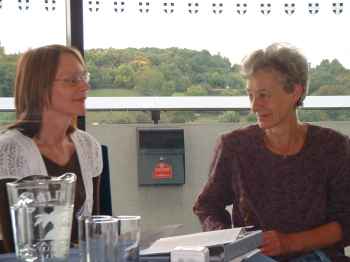
An ABC of Northern poetry gathered over tea and scones at the Gala Studio when Darlington's Jo Colley introduced readings by Gillian Allnutt and Peter Bennet with a reference to Gillian Allnutt's meditation (published under temporary license on the Blinking Eye website) about the duality of the verbs impose/ expose. This was only one of the apparent dualities which would be illuminated in the course of the afternoon: masculine and feminine, Durham and Northumberland, minimal, pared-down poetry and Victorian sentences: how would this odd couple work together?
Another contrast: while Peter Bennet read mainly from his latest collection, Goblin Lawn: New and Collected Poems (Flambard Press), Gillian Allnutt has recently (as the latest recipient of the Northern Rock Foundation Writer's Award) been able to set aside teaching commitments and concentrate on her writing. Among the poems she chose to read were a number of new pieces, and she started her first set with one of these. Earth, with its echoes of the liberation of Belsen, was, she warned her audience, an unsuitable accompaniment to the eating of scones.
She proceeded to explain one of the links between herself and Peter Bennet: he was associated in her mind with an event on which they had worked together or a Midsummer Day of Poetry in 1988. For her workshop on that day, she had chosen the typically uncompromising theme of Death, but this was not as bleak as it might sound, for she had invited her students to pick an invented name at random, and to write as if from the viewpoint of this person, after death, considering their most recent incarnation: and she read the poem which she had written on this occasion, Jehax (who had been an African king).
More recently she had been writing poems "in the voice of things", as if objects could speak and describe themselves. The Pitt Rivers Museum had been a valuable resource in this, with its collection of objects from all over the world: a knife from the mouth of the Yenisey River, "for scraping skins and for holding down sewing in a strong wind", a clay whistle in the shape of a fish from Poltava. Another source of inspiration was the Museum of Immigration in London's Spitalfields, with its permanent exhibition of suitcases.
Another poem gave a glimpse of Gillian Allnutt's working methods: a workshop exercise had left her with the single line: "They gawped like a carthorse chewing toffee." The carthorse, she said, had remained in the poem until the last draft, but had then been excised, although his ghost still lingered, alongside the ghosts (or at least, verbal reminiscences) of Donne and Langland. If this was mysterious, the title of the poem, Agape was equally riddling: it could simply be the state of staring, slack-mouthed, like the carthorse with his toffee, or it could be the love-feast of the early church.
At first glance, Peter Bennet's poetry seems more transparent: Claret, with which he opened his set, is a monologue spoken, he explained, by a senior officer in the Peninsular War - possibly Wellington himself, "Certainly not me!" This uncertainty tempers the Victorian solidity of the form: it as if Robert Browning, an acknowledged influence, had attributed one of his monologues to a character from Susanna Clarke's Jonathan Strange and Mr Norrell.
His next monologue moved frankly into the territory of fairy tales, as the Ogress reminisces:
I used to yoke the oxen, and the elephant,"Very few of my poems are autobiographical," he assured the audience. But even fairy tales may spring from the poet's own dreams, the half-coherent moment between waking and sleeping providing the "changing creature" glimpsed in the hedge at the end of Genealogy, the
to pull his wheelchair to the height
through veils of rain, so he could watch
the playful mountains throwing rocks
until the valleys shook their sides
and all the beasts ran from the woods.
...dream geese, docile, and too beautifulof Fairytale. Magic is not restricted to this pastoral world, in the manner of Walter de la Mare: Breathe Carefully gives instructions for casting a spell (or should that be, writing a poem?) using the contents of your own attic.
to raise their wings in clamour, or to scatter.

The spell seemed to have worked on Jo Colley, who opened the second half of the reading with the comment that she "felt like lying on a freshly laundered white sheet with a glass of claret in my hand." And as if to qualify this view of gracious living, Peter Bennet resumed his reading with one of his few urban poems, The Sisters, in which the narrative follows "a dwarf... in embroidered flounces"
from waste ground where the slicks reflect"They're batty, aren't they?" remarked the poet, cheerfully. "You just have to get used to it; it's hard enough for me!"
streetlights near the underpass.
The Museum motif popped up in two poems, Musée Folklorique (which can also be traced to a Breton piper heard playing in Hexham) and The Banner Men, in which a visit to the Edo Museum had somehow become entangled with a dream, whose dominant image became:
Look how his hammer splits the face
of that fine marble Mickey Mouse,
and, as he tamps them in position,
how well the grinning fragments fit the camber.
"I wish I had a dream life half as fecund as Peter's!", said Gillian Allnutt, resuming. Instead, she often works from pictures, though she added a twist of unreality to this, since she has worked extensively with pictures she has never seen: one of her plans, now that the Northern Rock Foundation has given her the means, is to visit the Paula Modersohn-Becker Museum in Bremen and see for herself the paintings which have sparked off her poems. Elsbeth, for example, is "a rather forlorn little girl"
But for the goose that goes with her,
alone among days.
Another poem had its roots in a workshop exercise responding to a piece of music. Arvo Pärt's setting of Psalm 130 ("Out of the Depths") had brought into her mind a wide river estuary, and a ragged procession making its way towards it to set an empty cradle on the waters, in a ritual whose meaning is forgotten, and ultimately, The River, Yenisey. Others come from daily life: one poem, described as "a little one that came out of a hillside", evokes a green space on the hillside, between two hawthorns, and was written on a November morning so cold that a biro refused to write!
An afternoon of surprising correspondances between the work of two apparently very different poets ended with one more surprise: the assembled company trooped off to Fowlers Yard to celebrate the opening of an exhibition of photographic portraits of some of the poets who have read at Colpitts Poetry events over the last 30 years.
 |
 |
| Previous report: Vane Women |
Next report: Gained in Translation |

